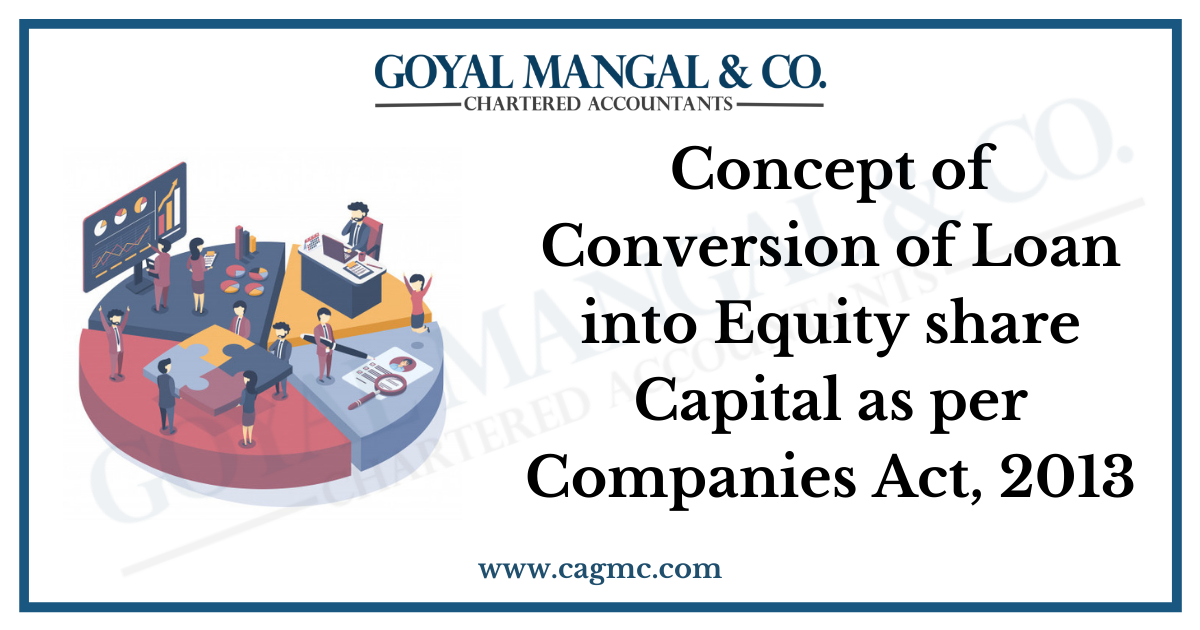The issue of shares has always been debatable under Section 62 of the Companies Act, 2013. To make sure that a company runs its functions smoothly, debt is often converted into capital. This Act elucidates that conversion of loan into equity is an easy and practical method to raise capital without immediate investments.
Conversion of loan into equity share capital is most reliable mode to raise capital without immediate investments. In order to carry out smooth business, at times, debt is converted into share capital.
Conversion of Loan into Equity share Capital
The Conversion of loan into equity share capital is the standard & reliable model to raise capital without direct investments. In pursuant to take out a smooth business in India at times, in that case, the debt gets transformed into share capital. The company can go for Change in Share Capital by transforming the fully paid-up shares into the Stock. The re-conversion of the stocks toward fully paid up shares can also be done additionally.
As per section 62(3) of companies act 2013 resolution, there is a procedure for conversion of loan into preference shares:
- Approve terms of the loan by passing a special resolution before taking of loan & file special resolution in E-Form MGT 14within 30 days.
- Convert loan into shares by passing a resolution in Board Meeting & File E-form PAS3 for allotment of shares Companies Act 2013 within 30 days
- Also, issue share certificate by passing Board resolution & file e-form MGT 14 within 30 days for the procedure for issue of shares by the private limited company.
- As per the provisions of Companies Act, 2013 you can’t take a loan from shareholder to private company or public company. However, a Director and his relatives are allowed to give a loan.
Advantages of conversion of loan into equity share capital of the Company
- No cash exchange occurs in the debt-to-equity swap.
- Increasing cash flow by decreasing liabilities.
- Avoidance to paucity of financial resources.
Provisions of Companies Act, 2013 for Conversion of Loan into Equity share Capital
The Companies Act, 2013 has emerged with new provisions for the conversion of loans into equity shares, and the same is included in section 62(3) of the said Act. According to provisions of section 62(3) of the Companies Act to convert the loan into share capital, the company has to take a loan on the terms that the loan will be transformed into share capital.
Moreover, if such an option has been approved by special resolution before perceiving the loan; in such case, subscribed capital can be raised.It must be observed, that it is at most valuable to pass the special resolution at the time of permission of the loan. Moreover, if the company is deprived of giving of a special resolution; in that case the loan cannot be transformed into share capital.
Concept of Debt & Equity Shares
Equity is money invested in a company by the owners who are called shareholders. The shareholder receives voting rights and he/she can vote in annual meetings which concern the management of the company for the future.
The shareholder receives a cash flow from the equity he/she owns when and if the company pays dividends. There may be a profit, loss, or no change in the original capital invested when he/she sells the equity.
Equity of a company is calculated by deducting the combined assets it has from the total liabilities of the company. The net worth of a company represents its equity, or what the company owns and what it owes.
Therefore, debt conversion to equity is a common transaction in the financial world. This way, a borrower can convert loans into shares or equity.
Procedure of Conversion of Loan into Equity Shares
As per Section 62(3) of the Companies Act 2013 resolution, there is a procedure for conversion of loan into preference shares:
- Approve terms of the loan by passing a special resolution before taking of loan & file special resolution in e-Form MGT-14within 30 days.
- Convert loan into shares by passing a resolution in the Board Meeting & File e-form PAS-3for allotment of shares under the Companies Act, 2013 within 30 days
- Also, issue share certificate by passing Board Resolution & file e-form MGT-14 within 30 days to start the procedure for issue of shares by the private limited company.
Step wise Process of Loan Conversion to Equity
If the loan conversion of the private company into a public company, companies act 2013 gives it the provision to do so by following the below-mentioned process:
STAGE 1: Steps before Issue of Acceptance of Loan
- Holding a Board Meeting
-
- To pass a resolution for acceptance of loan
- To pass board resolution for conversion of loan into equity shares of the company
- Issue a notice for holding extraordinary general meetings of shareholders.
- Holding Extraordinary General Meeting
-
- A company needs to pass a special resolution for conversion of loan into Equity share capital.
- Filing e-form MGT-14 within 30 days of the passing of Special Resolution with ROC.
- Enter into an agreement for the conversion of loan into equity
-
- Company shall enter into an agreement of terms of Loan
- This agreement should contain the terms of converting loans into the equity share capital of the company.
STAGE 2: Steps at the time of conversion Loan into share capital
- Hold a Board Meeting
-
- Pass board resolution for allotment of equity shares
- Prepare a list of all those who have got an allotment.
- Filing the E-form PAS-3 for allotment of shares within 30 days of Board Resolution has passed.
If any company accepted loan before 1st April 2014 (As per Companies Act, 1956) and wants to convert loan into Equity shares at present company then Company can’t convert such loan into shares according to section-62 of Companies Act, 2013 except if company passed the special resolution at the time of acceptance of loan.
This usually helps a company in increasing cash flow by decreasing liabilities. This move ensures that the company does not face a paucity of financial resources. This procedure is beneficial especially for small and medium-sized companies.



